Tag: Alexandra Huzyk ’20
Featured Friars Participate in Alternate Spring Breaks
by The Cowl Editor on March 15, 2018
Features
by Alexandra Huzyk ’20
News Staff
Students Build Homes and Hope for Habitat for Humanity
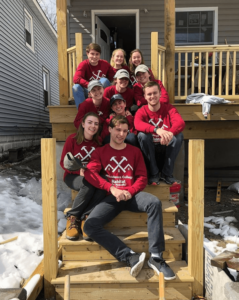
Providence College’s chapter of Habitat for Humanity, a global nonprofit housing organization, sent nine groups of students over spring break to help build affordable homes in locations across the East Coast.
Gaby DeParis ’18, the president of the College’s Habitat for Humanity chapter, shareD that she has been going on trips since her freshman year at PC. “I have such a passion for the organization and everything they stand for, and I love how hands-on the work is.”
DeParis shareD that her most recent trip to Bridgeport, Connecticut, was her favorite trip out of her four years with the program. “My favorite part of it, besides the amazing people I was able to work with, was meeting the future homeowners of the houses we were working on throughout the week,” SAID DeParis. She loved to hear their stories and said that it was amazing to feel the gratitude that they have for both the Habitat for Humanity organization and its volunteers.
“I went to Rockport, Maine,” said Emily King ’20. “My favorite part was definitely getting to know all of the people on the trip so well.” King also says that because her group never met the family of the home she was building, she expanded her personal meaning of service. “We completed our work, not to be thanked by anyone, but simply to help,” King said.
Emily Smith ’20, another first-time Habitat volunteer, said, “My group went to Kittanning, Pennsylvania, which is a pretty unique site because different churches in the area host you for dinner every night and allow you to interact with a lot of people from the community.” Smith shared that her group was able to bond very closely both amongst themselves and with the family that they were helping build a house for. “They had shared the story of their youngest son, Toby, who was diagnosed with brain cancer but luckily his tumor had shrunk,” said Smith. “He gave us all bracelets he made that said ‘Tuff Like Toby,’ so I’ll always remember that family and have them in my prayers.”
Global Studies Classes Take Students to Mexico and Nicaragua
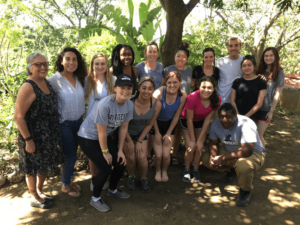
Over this past spring break, some Providence College students traveled to soak up the sunshine while others opted for an alternative type of trip. Students at the College currently taking the Global Studies class titled “Global Border Crossing” traveled to Mexico, while students in the class titled “Foreign Aid,” a separate Global Studies course, traveled to Nicaragua to study the complexities of foreign aid.
To further their studies of borders around the world, students in the “Global Border Crossing” course traveled to Tijuana, Mexico to work with an organization named Esperanza. Adrianna Perry ’20 says, “Esperanza, which means hope in Spanish, works to provide homes for low income families, while creating community in the process.” Perry shares that she decided to take this course out of concern for current foreign affairs and to learn more about U.S. immigration policies. Over the course of the week, students helped to create the foundations of new homes, visited the border wall named Friendship Park, and visited a health clinic treating people without health insurance. Delina Auciello ’18, a returner and a co-leader of the trip, adds that they also visited La Casa de Migrantes, where students, “spoke and shared dinner with migrants who have recently been deported or are looking to try to cross the border.”
Auciello says that the first part of a Global Service Learning Trip is to learn in class about the place you are traveling to, “then you are able to take this trip with a group of people you have been building relationships with over the semester and have this intense experience listening and telling stories, carrying narratives and challenging experiences back with you.”
“My favorite part of the trip was getting to see how much faith the people of Mexico have in Esperanza to provide for their needs,” despite their lack of funding, says Perry. Perry also shares that, “The most disheartening thing that I witnessed while in Tijuana were the eight prototypes for the border wall that have been created by six different contractors in Mexico.” Perry feels that we must work to change the narratives that migrants are not human in order to combat current and future immigration policies. Meghan O’Connor ’18 says, “the big takeaway for me was that the border is not just a political issue but something deeply personal and divisive and is directly hurting and impacting families and communities.”
Nicaragua was the destination of students in the “Foreign Aid” course. The class focuses on the impact of foreign aid. Students stayed in the area of Masaya and were hosted by a sustainable tourism business that is named La Mariposa. This organization, Daniela Miranda ’19 says, “is a Spanish school that hires Nicaraguan locals to teach Spanish,” but it also “functions as an eco-hotel and has multiple projects including a center for mentally and physically disabled children, an organic garden, animal rescue, and children’s programs.”
Sara Murphy ’20, another student who traveled to Nicaragua, says, “we learned about how different aid agencies and structures affect Nicaragua and the United States,” through visiting various grassroots organizations and NGOs. Miranda adds, “we traveled to Granada for an afternoon, went on an evening hike, took a salsa class, and walked through el Mercado Oriental, the largest market in Central America.”
Murphy recalls that the country itself was beautiful and that she will remember “the spirit of the people and the amazing sense of community we encountered.” As a business major, Miranda says that her favorite part of the trip was talking with a woman named Paulette, who is the owner of La Mariposa. “She wanted to build a sustainable business to create jobs and stimulate the local economy,” says Miranda, “I admired her desire to empower the locals by giving them something to call their own.”
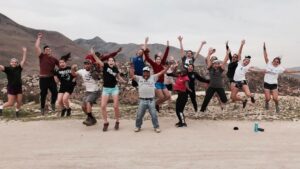
Discussion Held on Viewing Racism as Anti-Christian
by The Cowl Editor on February 15, 2018
Campus
Dr. Dana Dillon Speaks at First Theology on Tap of the Semester
by Alexandra Huzyk ’20
News Staff
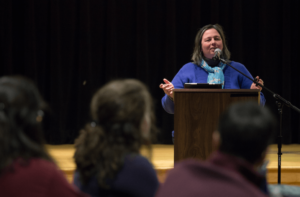
In honor of Black History Month, and as a continuation of the conversation initiated by Dr. Bernice King’s Convocation speech, the first Theology on Tap of the semester was titled “Anti-Racism as a Necessary Christian Virtue.” The talk, led by Dr. Dana Dillon, a professor of theology at Providence College, delved into the pervasiveness of racism in America and the corresponding responsibility of Christians to establish anti-racism.
Dillon began the talk by sharing with the audience a personal story about how racism has affected her. When she was younger, she had been contemplating whether or not she and a friend should go take a trip to Canada. In her rationale, she used the argument: “Why not? We’re free, white, and 21.” The friend that she was speaking with, however, was half Chinese and half Hawaiian. She felt ashamed when she thought about the implications of what she had said, and this instance served as a moment of realization. Dillon said, “I had received a script from my parents, and others, that was implicitly racist.”
Dillon stressed, “Unless we are working to be anti-racist, we are passing on inherited habits of racism,” and we cannot be truly “good” Christians if we act in either intentionally or subliminally racist ways. In order to combat this mentality, she elaborated upon the Aristotelian premise that like acts can become like habits. If people can commit to a particular act, they can become oriented toward virtue through their actions. In other words, if a person makes the conscious decision of acting in anti-racist ways, they can then eventually live a life of anti-racism and lead others to that same way of life. “We are so used to seeing subtle forms of racism, implicit forms of white supremacy, as normal ways of being in the world,” Dillon said, “Our sense of what justice and love of neighbor looks like is terribly skewed.” Dillon asserts that every person must make a conscious effort to orient all of their actions around charity and love.
To expand on the context of racism in America, Dillon provided a brief history of racism and how that has influenced our current state. First and foremost, the establishment of the United States of America began with the killing and displacement of Native American people. Following this, slavery became a widely accepted practice and institution that persisted for over 200 years. Even with the legal abolition of slavery, racism remained a pervasive part of society, emblemized by a history of sharecropping, Jim Crow, and lynching. To emphasize the prevalence and widespread approval of racism, Dillon emphasized a quote from a Catholic bishop in Louisiana. This quote asserted that slavery was a necessary institution, “far from an evil,” because they were not capable of freedom. In a historical context, it was believed that it was the Christian responsibility to take care of people of color in order to lead them to a good life. Dillon emphasized that this mentality towards slavery was extremely un-Christian.
Dillon said, “Our Christian responses to racism, like our Christian responses to anything, need to be centered around Christ.” She said that Christ—as a person who was able to cross boundaries and borders, interact with the marginalized and be their advocate—should serve as an example for Christians today. This encompasses a tradition which Christians call the preferential option for the poor, a theological mentality that proposes giving love and help to those in need of it most. Within the context of racism, that means Christians have a responsibility to help those in need regardless of their race or ethnicity.
Dillon ended her talk with some steps towards confronting racism, in order to establish a life of anti-racism. Her first step was to recognize that race and racism concerns everyone. Dillon said, “It’s crucial for those of us who are Christians to not fall into the trap of white moderates who get along with the status quo and reinforce racial structures in our failures to act on them in concrete ways.” Her second step urged students to discuss racism with their friends, proposing the idea that friends hold each other accountable for using more appropriate and effective language.
Dillon also suggested that students take a Black or Latin American Studies class that would give them exposure to different authors of color and discussion with peers. Another step that Dillon proposed is for students to go to events on campus that are hosted by people of color as a powerful sign of solidarity. Lastly, Dillon emphasized her last step; “try to develop friendships and relationships across ethnic barriers.”
Following Dillon’s talk, Katherine Martinez ’20 said that most people are unwilling to hear about the issue of racism because they do not understand that it affects everyone regardless of race. She emphasized Dillon’s point that “one way to be an ally to people of color is to listen and learn.” In this way, one can truly hear a person’s story and determine how it intersects with one’s own life.
Fly Eagles Fly: Students React to Philly’s Win
by The Cowl Editor on February 8, 2018
Campus
How a College in New England Reacts to the Patriot’s Loss

by Alexandra Huzyk ’20
On Sunday, February 4, Super Bowl LII was held in Minneapolis, Minnesota. Many Providence College students tuned in for the event, rooting for either the Philadelphia Eagles or the New England Patriots. Both McPhail’s and Campus Ministry hosted watch parties for the big game. In order to accommodate students watching the Super Bowl, the normal Sunday Mass schedules were altered.
The Providence College campus, located in the heart of New England, seemed to be scattered with students in red, white, and blue attire this past Sunday. As a college comprised predominantly of students who live within this region of the country, it comes as no surprise that many students chose to support the New England Patriots. Matt St. Jean ’20 said, “I’m a lifelong, diehard Pats fan, so I was rooting for them in the game.” St. Jean expressed that while watching the game, he became worried when the New England Patriots were losing to the Philadelphia Eagles. “The problems weren’t with scheming, but with talent. So I knew the defense would have problems all day,” he said. St. Jean also shared that when the game progressed into the second half, he felt that only a miracle could result in the Patriots’ victory.
Amidst the sea of Patriots fans, some students were rooting for the Philadelphia Eagles. Rita Murphy ’19 explains that, due to her loyalty to the New York Giants, she was rooting for the Philadelphia Eagles. Murphy said, “I went by the Campus Ministry center for the game because they always have really great food made by the Knights of Columbus as well as a huge projection screen to watch the game on.” She also explained that because of the College’s large New England Patriots fan base, watching the game was a bit tense.
Ben Simons ’18 was another student rooting for the Eagles. He says that he has been a fan of the Philadelphia Eagles his whole life because his family is originally from Pennsylvania. “As I have grown up in an area with predominantly Pats fans,” Simons said, “I grew up dealing with the Pats dynasty and their fair-weather fans.” Simons, who watched the game with other non-Patriots fans, describes being anxious while watching the game.
To the chagrin of New England fans, and to the delight of Philadelphia supporters, the Philadelphia Eagles won with a final score of 41 to 33. “The campus has shown a resilient spirit after the Patriots’ loss, but I was definitely feeling joyful for the Eagles’ victory,” said Murphy. Simons said that he felt ecstatic when the Philadelphia Eagles won the Super Bowl. Leicia Henderson ’19, a student who attended the watch party in Campus Ministry and a New England Patriots supporter, said, “I was obviously upset about the outcome of the game but I hope that the Patriots can work well in the off-season.”
Although the campus seemed to be divided, as students rooted for their respective teams, a love for football seemed to unite the campus this past Super Bowl Sunday. Following the game, there was a celebration, which was planned to be held at the Calabria Plaza Torch on Slavin Lawn. However, due to the rain, this small gathering was held in the Slavin Atrium.
Possibility of New Environmental Biology Major at PC
by The Cowl Editor on February 1, 2018
Campus
New Specialized Major in the Process of Getting Approved
byAlexandra Huzyk ’20
News Staff

In an increasingly competitive professional environment, students’ interests are expanding and changing. In response, Providence College continues to create new majors and courses, such as the new environmental biology major.
The process of creating a new major begins with deciding what the major will be. After that is decided, Dr. Fred Drogula, professor and president of the faculty senate, shared that a proposal must be put together. This entails the predicted course requirements and a list of the courses currently available at the College that could fulfill the requirements previously specified.
Drogula said, “We must think about the staffing, the funding, and if the College has the capacity for the major.” The proposal also requires an in-depth rationale, proof that this major aligns with the College’s mission statement, and a letter of support from a dean. After this proposal is completed, it is submitted to the faculty senate, and eventually to Father Brian Shanley, O.P., the president of the College. Overall, this process takes around four to five years.
“The administration,” Drogula said, “wants to know whether the proposed major is a suitable field and if it is something we should be offering.” Many factors have to be taken into consideration, including the resources the College has available and the expenditures that would be involved.
For instance, Drogula said the most recently introduced majors, global studies and classics, are very different in the resources that they required to become an official major. He explained, “Global studies pulls together a lot of classes from different departments to make an interdisciplinary major,” and required, “a group of faculty with expertise in those fields,” which the College did not necessarily have prior to the creation of this major. This prompted the College to hire specialized faculty and create completely new courses. Classics, on the other hand, did not require many resources, for most of the courses, and faculty for the major previously existed. Yet, Drogula asserted that both majors are valuable assets to the College and to the students themselves.
“Faculty are responding to student interest,” Drogula stated. “The administration has a responsibility to use student tuition wisely.” If interest in particular subjects and courses grows at such a rapid pace, it is clear to the administration that a major would be a beneficial addition.
Tom Bernard ’21, a member of the academics committee within Student Congress, has been working alongside Gabi Dess ’18 and Dr. Charles Toth to create a new major: environmental biology. Together, Bernard says he and Toth planned out the logistics of the major’s curriculum. Afterwards, congress passed a piece of legislation asking for the students’ collective support behind this new major. “I think that this major will be able to draw kids in who desire to study environmental studies or environmental biology,” said Bernard. “Adding this major to our school will give PC even more ground to stand on in terms of competing with academically-similar schools such as Fordham, Holy Cross, and Boston College.”
Regarding the creation of individual courses, Drogula explained that sometimes an individual professor wishes to create and teach a class of their liking. In this case, the professor would create a proposal that must be approved by the department chairs of the major the course would be offered under, the dean, the faculty senate, and the president. If a course will be taught by multiple professors, the planning process of the course is more collaborative in nature. The faculty senate, which has a committee dedicated to reviewing new courses, “approved at least 30 classes last year,” said Drogula.
“If a student wants to propose a course, they should ask a professor in that field about the possibility of the course being introduced,” said Drogula. Most departments offer courses called “Special Topic Courses” which can be fast-tracked in regards to processing. These classes can be offered a maximum of three times before they must go through the full process of becoming an available course. Drogula also mentioned that it is especially effective when a group of students shows interest in a certain topic or potential course.
Katie Comber ’18 recently proposed a course titled “Understanding Suicide: Prevention, Intervention, and Postvention.” Comber, a social work major, said, “As an aspiring social worker, when I found out that there is no required suicide prevention training in Rhode Island, I was shocked.” Inspired to help others become more educated on this topic, Comber said that she shared a public syllabus that a master of social work student had created while at Simmons College with Providence College’s Social Work department. They have approved the syllabus, and Comber shared that the course will most likely be offered next year.
Alumni Closed on Sundays, but Gains New Food Options
by The Cowl Editor on January 25, 2018
Campus
by Alexandra Huzyk ’20
News Staff
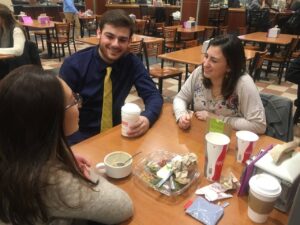
As the spring semester commences, students on the Providence College campus begin acclimating to both their new schedules and the recently altered dining hall hours.
The new hours for Alumni Hall are 10:30 a.m. to 11 p.m. on weekdays, and 12 p.m. to 11 p.m. on Saturdays. Eaton Street Café is open on Sundays from 10 a.m. to 12 a.m., and on Monday through Thursday from 8 a.m. to 12 a.m. The Café is open on Fridays from 8 a.m. to 10 p.m., and on Saturdays from 4 p.m. to 10 p.m. Thursday through Saturday, students can go to the Eaton Street Café’s window from 10 p.m. to 2 a.m.
Stuart Gerhardt, general manager of the dining facilities, explained that before each semester begins, the transaction history and sales of each dining facility are analyzed.
The semester is broken down into 15 minute intervals, in order to determine what times are the busiest and where students tend to eat. From the data that was collected from the past semester, Gerhardt says that, “a higher number of people are going to the Eaton Street Café during the week” in comparison to the amount of people eating at Alumni Dining Hall. This prompted the extension of the Café’s weekday hours.
In regards to the elimination of Alumni Dining Hall’s hours on Sundays, Gerhardt explains that the same analytical approach of sales was used. Due to a lack of people making transactions on Sundays, those hours were cut. Gerhardt said, “there’s always going to be a give and take,” and that at the end of the day, it comes down to making business decisions.
To compensate for the change in Sunday hours at Alumni, more hours were put into place at the Eaton Street Café. This decision was made with the intention of providing students with a different venue, in addition to Raymond Dining Hall. “Change is hard, but we believe the altered hours will encompass more students than in the previous semester,” says Gerhardt.
“Alumni is closer than Eaton Street Café, for people who live on upper campus,” said Maggie Burke ’19. In regards to the Café, she states, “It’s only the window that’s open late, so there’s nowhere to sit and wait,” which can be a problem in the winter weather. Many students also feel that the food at Raymond Dining Hall is less appealing in comparison with Alumni Dining Hall.Colin Williams ’20 said, “I feel like the Ray food is not as high quality as the Alumni food. While Ray has a larger selection, the food at Alumni seems to be better.” Williams also shared, “I was disappointed to hear about the change in hours because I know many students on campus eat there late on the weekends.”
These new hours will remain in effect for the entirety of the semester, but will be reexamined before the next semester begins. If the transactions do not increase at the Eaton Street Café, and the student body vocalizes discontent, then the hours of the dining facilities around the campus will be reevaluated.
Another change to Alumni Dining Hall is the addition of an Asian food station. “We sent out a survey last semester seeking input as to what students would like to see to replace the Mexican theme station and the overwhelming response was an Asian concept,” said Gerhardt. “We will look to keep it current and also look at menu trends. We want it to be fun and interactive.”
Some students have also wondered why there was not a Midnight Breakfast held this past semester. Before the start of finals week, there is typically an event held in Raymond Dining Hall where students can take a break from studying and eat a late night breakfast, free of charge. However, this past semester, this event was not held. The decision to not provide a Midnight Breakfast was agreed upon by Dean Steven Sears and Gerhardt, after they observed that, “in past years, participation rates have been going down.”
“Midnight Breakfast is a tradition,” Burke said, “and it’s needed especially before finals when we’re stressed.” Williams seemed to agree, stating, “I have gone to midnight breakfast and it’s a super fun way to blow off steam before Civ exams.”
Gerhardt emphasizes that because of the overwhelming student reaction, there will definitely be a Midnight Breakfast held at the end of this semester, and it will most likely be held in the semesters to follow.
Featured Friar: Lela Biggus ’18
by The Cowl Editor on November 30, 2017
Campus
Global Studies Student Encourages PC to Care for Cambodia
by Alexandra Huzyk ’20
News Staff
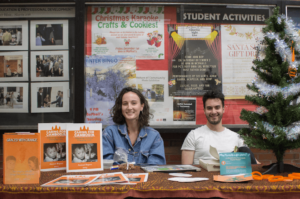
As we approach the holiday season, it becomes easy to get lost in the search to find the perfect gifts for your loved ones. Perhaps this year, you might consider spending your money on something with a greater impact.
On Wednesday, November 29, Lela Biggus ’18 provided students and staff at Providence College with an opportunity to buy ornaments and other small items. The proceeds of these sales, and the donations made in peoples’ names, will sponsor a team in the Angkor Wat International Half Marathon. The runners in this race seek to raise $25,000 to support Caring for Cambodia; a non-profit non-governmental organization which provides free education to children in Cambodia.
Caring for Cambodia, a program that began in 2003, was created by Jamie Amelio after she had traveled to Cambodia to see the temples of Angkor Wat. During her visit, she was approached by a little girl who asked her for a few dollars. When the girl was asked what she planned on using it for, she replied that with those few dollars she would be able to pay for and attend school. Upon visiting the schools, Amelio was appalled by the conditions. Biggus explained that the mass genocides that took place previously, from 1975 to 1979, left the country in disrepair, and “left young people without role models or teachers.”
Not only did Amelio’s experiences in Cambodia put the various disparities into perspective for her, but it also inspired her to create a program that would provide the children with the education they needed and desired.
Fast forward 14 years after her trip to Cambodia, and Amelio’s dream has begun to take shape. Twenty-one schools have been built within this time period, providing education for nearly 6,600 students. The primary goal, Biggus said is, “to get Cambodian youth into school, and then get them into higher education.” Caring for Cambodia also provides students with meals, clothing, health care, clean water, and gender equality programs.
For many college students, with tight budgets, it is important to understand the impact that their money can have elsewhere. The money that Caring for Cambodia receives is put towards constructing and maintaining school buildings, and funding teachers’ salaries, and training. Donations also provide students with health and dental needs, bicycles, and uniforms.
Biggus, an intern for Caring for Cambodia, was connected with the director of this program through the Global Studies Department at Providence College. “As a global studies major, I’ve always been drawn to causes having to do with education, especially those framed in a caring and thoughtful way,” said Biggus.
Part of why Biggus was so drawn to this particular program was that Caring for Cambodia not only provides children with an education they would not have had otherwise, but it also serves the greater community. As a product of Caring for Cambodia, communities, not just a select few individuals, benefit from clean water and the creation of public libraries.
Biggus said, “My awareness of the non-profit world and the ethics behind these NGOs informed my decision to support this organization.” This global awareness, which she attributes to the global studies program, has helped her to make educated decisions on whether or not an organization is being responsible in their actions. Often, there is plenty of criticism regarding humanitarian interventions, especially programs and initiatives implemented by the United States. Biggus said, “I believe education is the key to social advancement, and not just a useless humanitarian effort,” if done in a thoughtful way.
If you would like to donate to Biggus’ fundraiser, which will go toward supporting Angkor Wat International Half Marathon, visit https://www.youcaring.com/caringforcambodiainc-1010130.
You can also visit Caring for Cambodia’s website to learn more about their work, or donate to them directly: http://caringforcambodia.org/.
Catholic Political Debate Held in ’64 Hall
by The Cowl Editor on November 9, 2017
News
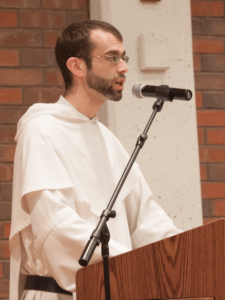
by Alexandra Huzyk ’20
News Staff
Seventy-five years ago, a political debate was held between Charles De Koninck and Jacques Maritain. The two philosophers were asked to determine the relationship between the common good and the individual good, and explain why they thought one should be prioritized over the other. On Thursday, November 2, a Catholic debate was held in ’64 Hall that presented the same question to Lawrence Gillheeney and Brother Henry Stephan, O.P. The debate was titled: “What Trumps What: The Individual or the Community?”
To start off the event, Father Bonaventure Chapman, O.P., presented the question to the audience and explained the format of the debate. The debate began with each person taking seven minutes to convey their opening statements to the audience.
Br. Stephan asserted that the good of the community should be held above the good of the individual. He stated, “I don’t deny the importance of the individual. Rather, this debate is about understanding why we should rank one over the other.”
Br. Stephan commenced his argument by defining the common good as being “diffusive of its good to several or many people at one time.” He claimed that human beings are, at the root of all things, social and political animals. It is because of these intrinsic qualities that human beings are drawn into communities and networks of people. He stated, “metaphysically, we are drawn to seek what we lack” and often fulfill these gaps in the midst of like-minded people. Br. Stephan finished his opening statement by saying that through the formation of these greater unities, human beings strive to become a part of something bigger than themselves; ultimately, they strive to attain God.
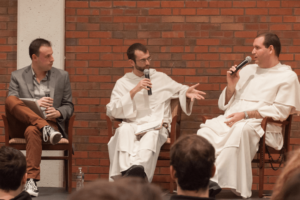
Gillhenney, in contrast to Br. Stephan, argued that the good of the individual should come before the good of the community. Gillhenney took on a rather pessimistic outlook on the capacities of the state. The main premise of his argument was that the state, as an artificial creation of the people, is “incapable of governing the common good.” Thus, the state is unable to provide humans with truth or fulfillment because it is oriented around the objectives of the few. He said that, “power in the hands of the few inevitably leads to corruption. There are too many different ideas,” that will create tensions between individuals and distract people from their mutual goals.
“Preserving the individual good is key to shaping the world to be the kind of place we want to live in,” Gillhenney stated. “Communal institutions,” which are inspired by individuals’ wills to make up for the inefficiency and bias of the state, “will drive the ability to do good beyond the state.” It is communities like non-profit organizations, or religious groups, that Gillhenney thinks will enable people to strive towards truth and justice, not the state.
After Br. Stephan and Gillhenney presented their opening statements, both individuals were given the opportunity to provide a rebuttal and then to cross examine their opponent. Br. Stephan began his rebuttal by arguing that the state is a necessary institution created to preserve the interests of the whole. He asserted, “The state is not an alien good. Because we’ve made the individual a buffered self, the common good seems unintelligible.”
Gillhenney’s rebuttal to Br. Stephan’s statements was quick and to the point. He plainly argued that Br. Stephan did not fully answer the question because he had only addressed the corruption of politics, to which the debate was not focused on. Gillhenney claimed, “It is a mistake to assume politics is the same as the state. The state is a creation of man,” and the reason why humans are prevented from fully attaining the common good.
Following their rebuttals and cross examinations, Fr. Chapman, as the adjudicator, posed a number of questions to both Stephan and Gillhenney in order to clarify and challenge their arguments. Once Chapman was done questioning both individuals, the floor was opened up to the audience for more questions. One student posed a question to Stephan, asking him to “address the ideas of the state as a part of the fallen world.” Stephan replied that, as fallen humans, we are unaware of our perfection and so we must realize that our interests lie within the common good and the community. He concluded that people must continue trying to build a more perfect society.
Women Empowered Sponsors Discussion on Equality
by The Cowl Editor on October 26, 2017
Campus
By Alexandra Huzyk ’20
News Staff
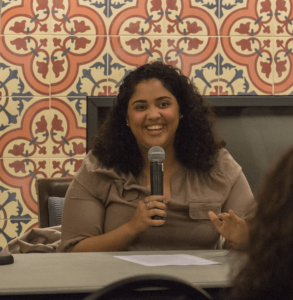
Women Empowered, a club recently created in 2013 on the Providence College campus, seeks to empower multicultural women through various discussions and activities. On Wednesday, October 25th, the club hosted a panel of five women of color to talk about gender, equality, and intersectionalism in 2017.
Upon being asked about the struggles they have faced as women of color, Michelle Saunders, a panelist with background in leadership development and adult education, responded, “Well how much time do you have?” Saunders shared that the hardest experience she has faced has been “trying to change people’s paradigms on what a woman of color is.” Another panelist, Laurie Moise ’12, stated that in the government there are not many women in power; never mind many women of color in power. She stated, “It’s hard seeing no one like you. It really makes you question: am I supposed to be here? Are they taking my voice seriously?”
As a professor at Roger Williams University, Dr. Kamille Gentles-Peart has faced similar challenges in the realm of academia. She explains, “I don’t typically fit the mold of a professor because not only am I a woman, but a woman of color with a Caribbean accent.” These differences, she states, lead to different reactions from students, which include “verbally challenging my syllabus, my assignments, my grading, or even in a subtler way when they choose to call me by first name without my permission.”
Katrina Alicea, an Administrative Coordinator in the Office of Residence Life at PC, asserts that, “The biggest challenge I have faced in the work place is having to establish respect and credibility in every single relationship you have.”
In response to the various challenges these women face in everyday life, all of the panelists seemed to agree that a good support system and physical activity are crucial in relieving stress and staying positive.
Rosa Ramos ’17, an employee of the organization College Visions, said, “The work I do is very emotional. When you read children’s essays, you start to read about their mental health and their home lives.” She said that using an outlet, like the gym, is a healthy way to alleviate anxiety that might come from the workplace.
Alicea stated, “A strong support system of friends and family, and having coworkers and mentors that I can go to for advice is extremely important.” From another perspective, Moise shared that, as a woman of faith, prayer helps her to get through hard times.
The panelists were also asked about the ways in which women of color can speak up for themselves, particularly in a society where white supremacy and ignorance are undeniably present. When Saunders faces ignorant comments from others, she said, “I ask questions to get them thinking, or I ask them to cite their sources.” Also, Moise said, “Speaking up for yourself can be hard, especially in a new field or when you don’t look like everyone else. But learning how to articulate your point in a way that shifts someone’s perspective is essential.”
According to Gentles-Peart, there are risks and difficulties in speaking up for yourself or for a marginalized community. She argued that because of this vulnerability, one must be strategic in how and when he or she chooses to speak up. Ramos stressed that “understanding why you need to speak up” is the first step in confronting others.
Alicea insisted that even in a field where women of color may be lacking, young women should not be deterred. She said, “There’s a first for everything. If you’re passionate, go and live your dream because there’s no ceiling restraining you.”
Phoebe Jean ’19 said, “I learned a lot about how to be a woman of color in the workplace, and I feel more confident after hearing that these women have gone into these difficult places and were able to achieve great things.”
“I came because I wanted to hear what the speakers had to say,” said Jarely Paulino ’18. “I really liked the part about talking to other women and networking with them.”
The panelists were able to give students advice from their experience as women of color, and drew connections between issues of gender and equality as they applied to their lives.
Featured Friar: Thomas Nee ’18
by The Cowl Editor on October 20, 2017
Features
by Alexandra Huzyk ’20
News Staff
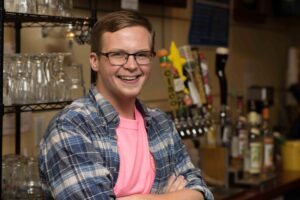
If you do not already know Tom Nee ‘18 personally, there is a great chance you have heard his name mentioned around campus. Many people might recognize Nee as a friendly face behind the counter of McPhail’s, or as a Peer Ministry coordinator. However, his on-campus involvement does not stop there. Nee also serves on the executive board for the Providence College chapter of Habitat for Humanity as a coordinator for this year’s NOLA Immersion Trip, and plays guitar in the 10:30 p.m. Mass ensemble.
As people continued to stop and say hello to Nee throughout our interview, the extent of his social circle became increasingly obvious—a reflection of his involvement and outgoing personality. So, you can imagine my surprise when Nee said he “was unbelievably shy and uninvolved in high school.”
“Something was calling me. The Catholic identity made it feel more like home,” Nee said, recalling his decision to attend Providence College. Nee entered his freshman year undeclared, with the intention of becoming a business major. However, Nee said, “I remember sitting in Civ Seminar, talking about Paradise Lost, and discussing a lot about the theological implications of salvation and suffering,” and truly enjoying it. His love for these deep discussions, and their centrality to his faith, made it clear to him that theology was his calling.
Faith continues to play an integral role in Nee’s life, especially within his involvement in Campus Ministry. “Every position we hold is a lot more than just a resume builder,” Nee said. “Campus Ministry has allowed me to grow in my faith and grow in community with others.” As a participant in the pilot program of Peer Ministry, Nee has seen the program grow from a small group of people to around 300 students. Nee also plays the guitar during the weekly 10:30 p.m. Mass. He said, “I’m in love with folk music, and know how to play the guitar, banjo, and mandolin.” During Mass, Nee says, “looking out and seeing a packed house of college students” is a beautiful portrayal of “faith being active in our lives, which you don’t get in a lot of other schools.”
“Tom is very dedicated to everything he does,” says Keith Lee ’18, president of Campus Ministry and a friend of Nee. “He’s attuned to how other people are feeling and making sure that they are supported and cared for, which plays a big part in Campus Ministry.”
Nee chose to study abroad in Rome the fall semester of his junior year, where he “lived down the street from the Vatican, and across from the Basilica.” He admited, “I was at a weird place in my life,” at the beginning of his study-abroad experience, “feeling a little unfulfilled.” Through his travels, Nee realized, “the Church is important, but what it brings to you, and what you bring to the Church, is equally as important.”
While describing his travels, Nee spoke of Poland—where his experience at Auschwitz “was sad but powerful”—and Athens—where he climbed the second tallest peak of Mount Olympus with a friend he has known since preschool. Before returning to the U.S., Nee went to the Vatican to get some items for his family members blessed. It was here that he met the Pope, who smiled at him from a mere shoulder’s distance away. “It made me realize how active the Church is in the world and in myself,” says Nee. Upon returning home, Nee recalls “embracing all of my [his] friends” and “remembering what a great community I’m [he’s] part of.”
“Tom Nee is an amazing guy, he’s like a brother to me. He’s helped me grow in my faith and I’ve learned to love better because of him,” says Kelsey Doyle ‘19, a McPhail’s employee. As I asked the employees about their experiences working with Nee, they all gave positive comments. Tricia Swanson ’18G, another McPhail’s employee, said, “You can’t help but smile when you hear Tom’s name. People request to work with him, and he’s always willing to help out.”
When asked what was one thing he wanted to accomplish before graduating, Nee jokingly responded, “Have a party in the tunnels” or “Make the half-court shot at a basketball game.”
“At the end of the day, I want to love what I do,” said Nee. After graduation, he plans to pursue a master’s in theology and remain involved in ministry.
Achieving Academic Excellence
by The Cowl Editor on September 28, 2017
Campus
Stronger at PC Encourages Students to be Their Best
by Alexandra Huzyk ’20
News Staff
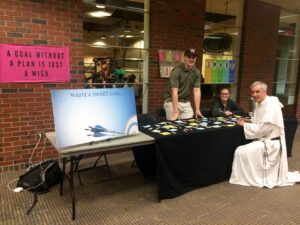
Stronger at PC, an academic program introduced last year, is back to help students develop healthy study habits and time management skills. Students of all grades can benefit from the various events being held throughout the week.
Gabriella Dess ’18, academics chair of student congress, says that Stronger at PC was created “to encourage students to be their best selves both academically and socially, stressing the importance of work-life balance.” The events will offer students study strategies that can be incorporated into their busy routines, so that they can better maintain a balanced lifestyle.
For freshmen especially, balancing academics, extracurricular activities, and a social life might seem like an intimidating feat. With newfound freedom and a surplus of free time, it is all too easy to focus too much on one aspect and not enough on another. Overall, acclimating to college life can be a difficult, and sometimes overwhelming, experience. Meghan Murray ’02 and ’04G, associate director for student success & retention, says, “The goal is to bring awareness to some study strategies, particularly for freshmen.” For instance, on Monday at 7 p.m. in Ruane 206, students can attend a discussion with Dr. Mulcahy, a chemistry professor, who will discuss what it’s like to be a science major at Providence College. On Wednesday, there is a workshop dedicated specifically to discussing strategies to help freshmen and sophomores tackle their Development of Western Civilization lectures and seminars.
Another event occurring during the week is a SMARTER Goals Booth to help students develop specific and attainable academic goals on Monday from 10 a.m. to 1 p.m. in Slavin. Throughout Monday and Tuesday, there will also be a student Snapchat takeover providing quick organization tips and tricks via Providence College’s Snapchat account, @provcollege. Also on Tuesday, students can attend drop in hours at the Writing Center from 2 p.m. to 3:30 p.m. Here they can get feedback on writing pieces and learn about helpful tips to use in a variety of writing formats. On Thursday, there will be a “Note Taking Hacks” event that will discuss strategies that will help students take more efficient and helpful notes. On Friday, “Flourishing Friar-days” will address the importance of sleep and how it relates to academic success. Murray says that for “every event that a student goes to, or if they share a tip” on social media with the hashtag #StrongeratPC, “their name is entered into winning a PC basketball jersey.” At the end of the week, a winner will be randomly chosen from this raffle.
Regardless of grade or age, most students are not conscious of how their study habits affect their health, and might not ask for help when they need it. Murray says that by “having conversations in spaces that are less academic, we can destigmatize the concept of studying.” Stronger at PC works to create an inclusive discussion on how properly managing one’s time can help alleviate stress and benefit students’ overall health. Dess says that the strategies students learn from these programs will allow them to “manage their time wisely and get everything done in an appropriate, safe, and healthy way.”
As a senior, Dess’ advice to freshmen is to “use their time well and figure out a system to get things done ahead of time,” which will help to alleviate stress or anxiety that might arise from deadlines. The skills students acquire from Stronger at PC are not only applicable to their time here at Providence College, but can also be useful after graduation. “Time management is a life skill,” Murray says, and college is “the best space to see what strategies work best for you.” By tailoring study strategies to students’ own lifestyles, they can use their time more efficiently and productively, thus, helping students to achieve a healthy work-life balance.
